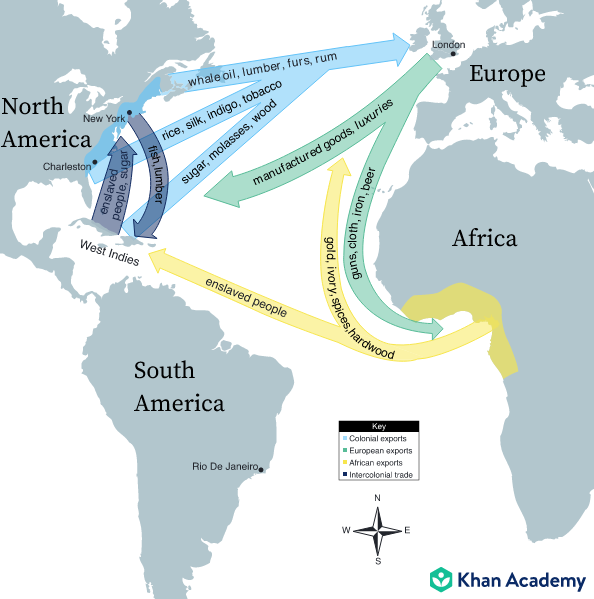Transatlantic trade
- During colonial times, Britain and its colonies engaged in the "triangular trade", transporting natural resources, goods, and people across the Atlantic Ocean to enrich their motherland.
- Trade with Europeans had far-reaching effects on Native American communities, including wars, cultural shifts, and disease.
- The British government attempted to control colonial trade through measures such as the Navigation Act, but only sporadically enforced the Trade Act.
Atlantic Highway

In the colonial era, the Atlantic Ocean served as a highway between Europe, Africa, and the Americas, tying together a network of people, raw materials, finished goods, merchants, and sailors that brought wealth to colonial empires. Establishing colonies promoted mercantilist goals in two ways: first, the colonies ensured the mother country had a cheap supply of raw materials (timber, sugar, tobacco, furs, just to name a few), and second, the colonies served as captive market for finished goods (furniture, guns, metal implements). Although this generalization demonstrates how each continent supplied the others with the goods or labor they lacked, the reality was a bit more complex: few ships would have completed the full triangle, and ships might also make more than one stop in the colonies—to exchange food from New England and enslaved people from the sugar islands, for instance. The British colonies in North America specialized in producing or obtaining commodities that Europeans valued: the islands of the Caribbean produced sugar, Carolina produced rice and indigo, the Chesapeake produced tobacco, and the Middle colonies produced foodstuffs like grain.
With shorter growing seasons, the New England colonies could not produce cash crops but instead chopped down their abundant forests to build ships for fishing and for carrying cargo across the Atlantic. After a grueling Middle Passage by boat in which about one-third of captives died, most enslaved laborers arrived in the Caribbean to work on the sugar islands, like Barbados and Jamaica. Although few enslaved people worked in the New England colonies, those colonies propped up the colonial system of slavery by sailing Middle Passage ships and selling provisions to enslavers. .
European trade and Native Americans
European traders prized the animal skins that Native American hunters provided: beaver furs in the North and deerskins in the South. Native Americans groups competed with each other for access to European trading partners, seeking to block their enemies from obtaining guns and other valuable commodities from the English, French, or Dutch. The bottomless European demand for beaver furs drove Native Americans to hunt them near to extinction; conflict between native groups increased as they encroached on each others` hunting territories.
Trade and empire
In order to profit from the Mercantilist system, Britain had to ensure that the booty of the empire entered its coffers. In 1651 Parliament passed the first Navigation Act, intended to govern the terms of trade between Great Britain and its colonies. Among other restrictions on colonial trade and manufacturing, the Navigation Act allowed "enumerated" commodities (the most valuable colonial commodities, such as sugar and tobacco) to be carried on British ships and transported to British ports. In this way, the British royal family was able to collect tariffs on imported goods, and British merchants and shipbuilders could profit from this transaction. benefited from these laws. However, the Navigation Act was only enforced. The British government sometimes sought to impose tighter controls on its North American colonies. For example, James II converted a property colony into a royal colony, raised tariffs on listed goods, and established the Vice-Admiralty Court in Boston to enforce the Navigation Act. When the Catholic King James II was overthrown in 1689 in favor of the Protestant monarchs William and Mary, the new king and queen relaxed or eliminated many of James's coercive measures. During the 16th and 17th centuries, trade laws (and their scope of enforcement) changed as new kings and new prime ministers came to power in the British government. From the 1720s to the 1760s, there was a long period of "beneficial neglect" in which British officials overlooked colonists' violations of the Navigation Law. But that ended in the reign of George III in the 1760s. He sought to regain control of colonial trade. The settlers rebelled, eventually sparking the American Revolutionary War.